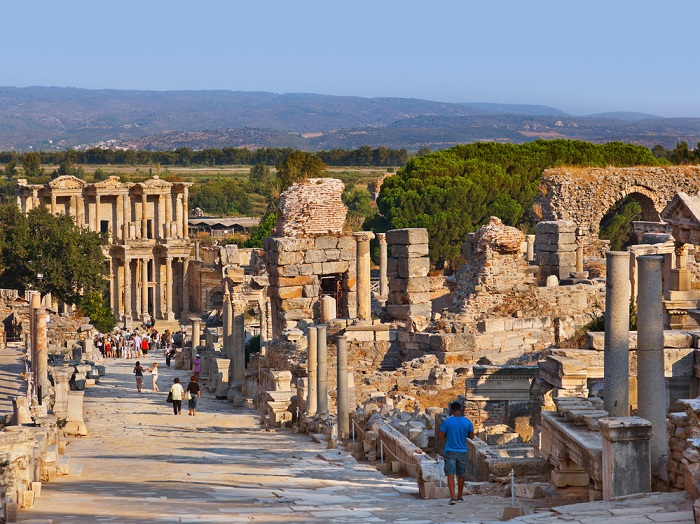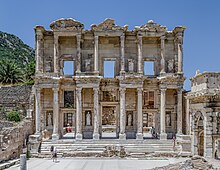Proper 10b, Chapel of Our Saviour
Proper 10b July 11, 2021 Our Saviour, Rock Hill
Introduction to Ephesians
Over the next 6 weeks, on Sundays we will be hearing from Paul's letter to the Ephesians. Ephesus. If any of you have made one of the excursions that follow Paul's travels you might well have visited. It's on the coast of Turkey. The ruins you would have seen are spectacular and vivid.


By Benh LIEU SONG - Own work, CC BY-SA 3.0, https://commons.wikimedia.org/w/index.php?curid=15578063
Part of today's reading we hear on the 2nd Sunday of Christmas. It's that kind of reading. It is majestic. It takes a cosmic view. In contrast to many of Paul's letters where he is responding to particular issues in particular places and times.
Whole of Creation
In this letter the theme is not about local conflicts or issues. Here the perspective is Christ's redemption of the whole of creation. Here we have a big scope. This is the big picture.
When I read from this letter I have feelings something like a thirsty athlete feels when they get ahold of some quenching drink.
- God chose us in Christ to be holy and blameless in God’s presence before the creation of the world.
"Ah, now I am in the presence of the Sacred!"
It is a classic view of Christ as the Lord of all creation. Creation is big.
- Christ has reconciled all creation to himself and to God, and
- Christ has united people from all nations to himself and to one another in his church.
Adoption
In just these opening verses we hear a theme that runs throughout the New Testament, taking several different guises. I refer to the theme of adoption. Sometimes it seems mundane, seeming to refer to the very human activity of people and families adopting children. At other times "adoption" is very clearly a metaphor intended to point us in the direction of God and God's relationship to us.
Many years ago when I was in graduate school I took a seminar on the theology of ministry. The basic method we used was to observe a variety of different ministries – I mean really different kinds of ministries – and then to come back to our group and to reflect theologically on what we observed.
We observed the usual kinds of things like Sunday worship, funerals, weddings, etc. But we also observed some less traditional ministries. In the early 1980’s that included radio ministry, which was mostly being done by conservative Protestant ministers. I didn’t feel particular affinity with them but I chose to approach my “research” with an openness based precisely on the fact that I didn’t know or relate to it.
I ended up listening to one program in particular that changed my life. Imagine that. It was by Chuck Swindoll. My recollection was that he was teaching on the prophet Hosea, but my memory could be faulty on that point. What is very clear to me is the theme. The theme was adoption. The narrative in the Bible was about God adopting the people as his own. In spite of everything …
Swindoll's lesson was, for me, something like Jesus' parables in his day. They used ordinary language, ordinary concepts and images, but always with a twist, a turn, that was intended to "hook" us. The catch was always to spur and motivate us to some kind of action or conversion.
Because "adoption" is such an apt metaphor for the relationship between God and God's creatures, I genuinely had to re-evaluate my own life and relationships.
We are not God and we are not even part of his “family” except in so far as God created us to be like him. So the love that God has for us is not particularly like that of a biological father and mother, but more like an adopted father or mother.
At that point in my life, the birth of my oldest children had been the thing that awakened love within me. Little did I guess, however, that it would be the entrance of children more like adopted children that would really teach me about love.
I went on in future years to be a host for a number of foreign students and invited young people to live with me for extended periods of time. There would be the older folks who became like aunties & uncles to me and the adopted children of other families that would become more like children than my biological children.
In Hawai'i I learned first hand of how indigenous peoples around the globe and throughout time have placed as high a value on adopted members of a family as on the biological members. Hosting exchange students on several occasions in my life has provided me with the opportunity to exercise unconditional love with people who lived much of their lives in other cultures and other traditions. I have bonded with children of students to the point that they call me "grandpa."
Paul was onto something when he greeted the Ephesians with the blessing we have heard this morning. The love of adopted children mimics God's love for us. What could be more powerful than that?
He destined us for adoption as his children through Jesus Christ, according to the good pleasure of his will, to the praise of his glorious grace that he freely bestowed on us in the Beloved.
Understanding the mystery of God’s will
With all wisdom and insight he has made known to us the mystery of his will, according to his good pleasure that he set forth in Christ, as a plan for the fullness of time, to gather up all things in him, things in heaven and things on earth.
Reading this letter to the Ephesians invites us to see ourselves in a new perspective. As if the backdrop to a selfie taken of us with our camera revealed the entire universe and the night sky, filled with galaxies and dark matter, black holes and magnificent nebulae. We are a part of a plan that is awesome in the extreme.
God made us a part of that plan.
But I am with Paul when he says that God has a plan for the fullness of time and that all things will be gathered up in him.
Paul is painting a picture of God's people in the letter to the Ephesians.
- adoption into God's family
- redemption through blood -- blood of sacrifice and blood that binds family together
- we set our hope on Christ and that truly makes all things possible
- marked with the seal of the Holy Spirit and that empowers our often timid movement forward
What does this letter to the Ephesians tell us about the life we are living today?
There is certainly the evocative invitation into a life of holiness in the family of God. There is also a biting indictment of the ways we fall short of "fullness of time" which God has planned for us.
The letter will go on beyond today's reading and evoke a unity fashioned from our differences and diversity. Paul's words in this letter plead with us as God's adopted children to see unity in the world's variety, the rich and even more in the poor, in the splendid variety of colors, shapes, and abilities of God's family, in the richness of the gifts God has laid before us.
We will hear in chapter 3 about all the gifts that have been prepared and given to us for the purpose of mission. They are not for our comfort or convenience. They are for leading those who do not know the richness of God's diverse family into the awareness and knowledge of God's glory.
As we listen to these words throughout the rest of the summer, I urge you to hold tenaciously to an awareness of the majesty and glory of what is being put before you.
Like you, I have expected to find glimpses of glory in the church at Christmas or at Easter. I have had to cultivate seeing glory in the ordinary of our every day lives.
Paul urges us to expand our vision, to widen our sense of engagement with the world. What is at stake is God's cultivation of the garden beyond our imagining.
And we are a part of it. Don't bow your heads in retreat. But stand at the energy emanating from the divine source. Be ready to take a stand, to make a change, to love another who grieves or suffers.
We have been marked with the seal of the promised Holy Spirit. Our hope is based on God's promise of redemption and incorporation into his family. It is a multi-colored family and most of it doesn't look or act like us. But it is all for the praise of God's glory.
Comments
Post a Comment